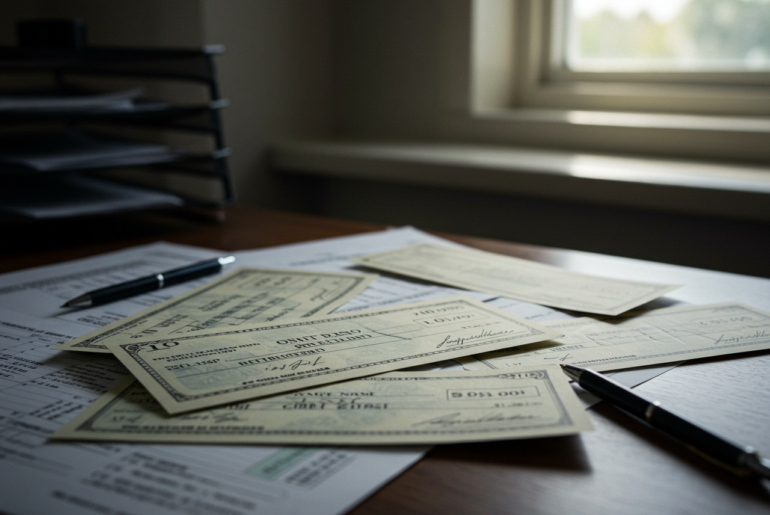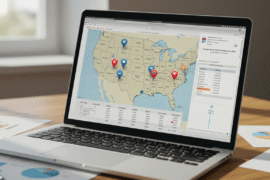This article may contain references to products or services from one or more of our advertisers or partners. We may receive compensation when you click on links to those products or services. Nonetheless, our opinions are our own.
The information presented in this article is accurate to the best of our knowledge at the time of publication. However, information is subject to change, and no guarantees are made about the continued accuracy or completeness of this content after its publication date.
Unreconciled checks that are still open can make financial statements look wrong.
Checks that are still outstanding are a part of personal and business finance that people often forget about. They can quietly mess up cash flow, cause accounting errors, and lead to fees that could have been avoided. An outstanding check is a payment that has been sent and recorded in the payer’s financial records, but the bank has not yet cleared it. Depending on what the recipient does and how the bank works, this delay between issuing and clearing can last days, weeks, or even months. Even though more and more people are paying with digital methods these days, checks are still used for a number of reasons, such as vendor preferences, payroll payments, or formal transaction requirements. But because check processing is done by hand, it creates certain problems for managing money. If you don’t keep an eye on them, outstanding checks can make your account balance look higher than it really is, cause overdrafts, and lead to stale check problems, where the check is no longer legally valid. Anyone who is in charge of making sure that budgets and financial reports are accurate needs to know what outstanding checks are, how they happen, and the best ways to deal with them. It looks at what causes outstanding checks, how they affect personal and business accounts, and what steps you can take to handle them well and stop them from happening again.
- What Are Outstanding Checks?
- Common Causes of Outstanding Checks
- Financial Risks Associated with Outstanding Checks
- How to Track and Manage Outstanding Checks
- Preventing Outstanding Check Issues
- Importance of Reviewing Bank Statements
- Consequences of Bounced Checks
- Conclusion
- Frequently Asked Questions
- Recommended Reads
What Are Outstanding Checks?
Outstanding checks are written and recorded payments that have not yet been presented to the bank for clearing. These payments remain in a pending state until the recipient deposits or cashes the check, and the bank processes it against the account.
Important characteristics of an outstanding check:
- It has been issued by the account holder.
- It is recorded in financial records.
- It has not cleared the bank account.
Common Causes of Outstanding Checks
| Cause | Description | Potential Impact |
|---|---|---|
| Delay in Depositing | The recipient postpones depositing the check for personal or business reasons. | Extended pending periods may cause inaccurate account balances. |
| Lost or Misplaced Checks | Checks may be misplaced by the recipient or lost in transit. | Payment delays, possible need for reissue. |
| Bank Processing Delays | Certain banks or branches may take longer to process checks. | Longer outstanding periods, affecting reconciliations. |
| Recipient’s Financial Circumstances | The payee may delay depositing if prioritizing other payment methods. | Budget misalignment for the issuer. |
Financial Risks Associated with Outstanding Checks
Outstanding checks can create financial uncertainty and affect both personal and business operations.
Main risks include:
- Overdrafts and Insufficient Funds: An inflated available balance may lead to spending funds already committed to a check.
- Accounting Errors: Unreconciled checks that are still open can make financial statements look wrong.
- Stale Checks: After a standard period (often six months), banks may refuse to honor a check, requiring reissuance.
- Bank Fees: Dormant or invalid checks may trigger bank penalties.
How to Track and Manage Outstanding Checks
1. Maintain Accurate Records
- Record the check number, payee, amount, and issue date immediately after issuance.
- Use a check register, spreadsheet, or digital finance software.
2. Conduct Regular Reconciliation
- Match issued checks against monthly bank statements.
- Mark cleared payments and followed up on pending ones.
3. Contact the Payee
- Confirm receipt of checks that remain outstanding beyond 30 days.
4. Issue Stop Payments When Necessary
- If a check is lost or remains uncashed for an extended period, request a stop payment from the bank.
Sample Tracking Table:
| Check No. | Amount | Date Issued | Payee | Status | Days Outstanding |
|---|---|---|---|---|---|
| 101 | $150.00 | 2023-10-05 | John Doe | Outstanding | 30 |
| 102 | $300.00 | 2023-10-10 | Jane Smith | Cleared | 5 |
| 103 | $75.00 | 2023-10-15 | Office Supplies Co. | Outstanding | 45 |
Voted "Best Overall Budgeting App" by Forbes and WSJ
Monarch Money helps you budget, track spending, set goals, and plan your financial future—all in one app.
Get 50% OFF your first year with code MONARCHVIP
Preventing Outstanding Check Issues
| Strategy | Benefit | Tools/Methods |
|---|---|---|
| Electronic Payments | Immediate clearing, reduces risk of outstanding checks | Bank transfers, payment apps |
| Automated Reminders | Ensures timely deposit or follow-up | Calendar alerts, finance software |
| Weekly Account Review | Detects delays early | Online banking review |
| Vendor Agreements | Sets clear deposit timelines | Written payment terms |
Importance of Reviewing Bank Statements
Regular bank statement reviews help identify outstanding checks quickly, catch unauthorized transactions, and track spending patterns.
Benefits:
- Fraud detection
- Budget adjustments
- Avoidance of bank fees
- Accurate cash flow management
Suggested Review Frequency:
| Transaction Type | Review Frequency |
|---|---|
| Direct Deposits | Monthly |
| Bill Payments | Weekly |
| Check Transactions | Weekly |
| Card Transactions | Biweekly |
Consequences of Bounced Checks
A bounced check, resulting from insufficient funds when an outstanding check clears, can lead to:
- Bank fees for both issuer and payee
- Negative entries in banking history
- Potential legal actions in severe cases
- Damage to business or personal reputation
Conclusion
It may seem like a small administrative issue to have outstanding checks, but the effects can be huge. They could mess up financial records, cause banks to charge fees, and make it harder to plan a budget. To be a good manager, you need to keep good records, make sure payments are made on time, and talk to recipients before they get the money. The best way to do this is to use both old-fashioned check tracking and modern financial tools. This way, every payment is tracked and processed quickly. Setting clear rules for writing and following up on checks not only protects your finances, but it also makes you more trustworthy in both personal and business dealings. In a time when digital payments happen in real time, knowing how to handle and know outstanding checks is still an important skill for keeping your finances stable.
Frequently Asked Questions
How long do outstanding checks remain valid?
Most checks remain valid for six months from the date of issue. After this period, they may be classified as stale and refused by banks.
Can outstanding checks affect budgeting accuracy?
Yes. They can inflate the available account balance, leading to overspending and possible overdrafts.
What is the fastest way to eliminate outstanding checks?
Switching to electronic transfers or direct deposit can minimize the risk of checks remaining uncashed.
Should all outstanding checks be canceled after 90 days?
Not always, but checks that are more than 90 days old should be looked at and the person who got the money should be called. If the problem isn’t fixed, you might want to stop payment and send the check again.
Are there legal implications for uncashed checks?
While there are generally no legal penalties for a payee delaying deposit, certain business contracts may require timely payment processing, and stale checks may need to be reissued.

Reviewed and edited by Albert Fang.
See a typo or want to suggest an edit/revision to the content? Use the contact us form to provide feedback.
At FangWallet, we value editorial integrity and open collaboration in curating quality content for readers to enjoy. Much appreciated for the assist.
Did you like our article and find it insightful? We encourage sharing the article link with family and friends to benefit as well - better yet, sharing on social media. Thank you for the support! 🍉
Article Title: Easy Tips to Manage Outstanding Checks and Protect Your Finances
https://fangwallet.com/2025/08/12/easy-tips-to-manage-outstanding-checks-and-protect-your-finances/The FangWallet Promise
FangWallet is an editorially independent resource - founded on breaking down challenging financial concepts for anyone to understand since 2014. While we adhere to editorial integrity, note that this post may contain references to products from our partners.
The FangWallet promise is always to have your best interest in mind and be transparent and honest about the financial picture.
Become an Insider

Subscribe to get a free daily budget planner printable to help get your money on track!
Make passive money the right way. No spam.
Editorial Disclaimer: The editorial content on this page is not provided by any of the companies mentioned. The opinions expressed here are the author's alone.
The content of this website is for informational purposes only and does not represent investment advice, or an offer or solicitation to buy or sell any security, investment, or product. Investors are encouraged to do their own due diligence, and, if necessary, consult professional advising before making any investment decisions. Investing involves a high degree of risk, and financial losses may occur including the potential loss of principal.
Source Citation References:
+ Inspo
Tyson, E. (2023). Personal finance for dummies. John Wiley & Sons.












































